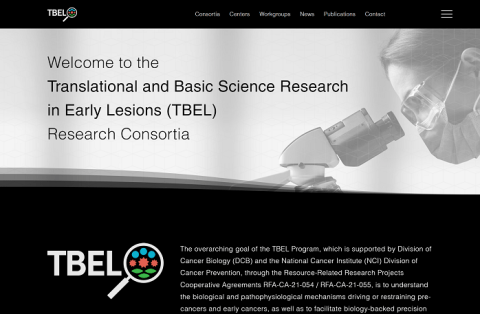The Translational and Basic Science research in Early Lesions (TBEL) program is a collaborative research network that aims (1) to further understand the biological and pathophysiological mechanisms driving or restraining precancers and early cancers and (2) to facilitate biology-backed precision prevention approaches.
The TBEL program is a partnership between the Division of Cancer Prevention and the Division of Cancer Biology.
On This Page
- All Heading 2s will automatically be pulled in to this list.
- Do not edit the content on this template.
About TBEL
The progression of an early lesion to malignancy is a complex process that can occur over a period of many years. Systematic investigations that integrate basic biology and translational efforts to develop mechanistically informed signatures of early lesions and their trajectories over time will allow the establishment of direct relationships between different subtypes of lesions and stromal cells, extracellular matrix and biochemical events in a clinically meaningful manner.
The TBEL program is designed to foster multi-disciplinary collaborations within each Research Center and across the TBEL network to promote a deeper understanding of early lesions, their microenvironment, and reciprocal interactions that drive early lesion fate and clinical outcomes.
Research Centers
The TBEL network will include up to five U54 Research Centers.
The U54 Research Centers will integrate basic and translational cancer research studies to iteratively examine the direct causal relationships and interactions of early lesions, their microenvironment, and host-systemic factors as “co-organizers” of tumor initiation (or suppression) and malignant progression in conjunction with the clinical characteristics of the lesions.
Coordinating and Data Management Center (CDMC)
The TBEL network will include one U24 Coordinating and Data Management Center (CDMC).
The U24 CDMC will (1) coordinate program-wide meetings and conferences, and cross-network collaborative activities; (2) provide statistical and computational analysis support; and (3) serve as a program data hub for data capture, curation and management, and protocol development.

